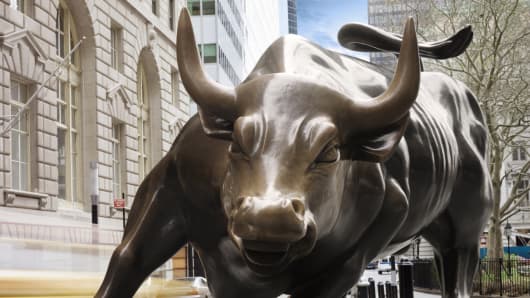The last point is important: if traders were playing nothing but the global growth story, you would expect cyclicals like the Dow industrials to be the market leaders by a long shot. But look at the leadership:
S&P Sector Leaders in January:
- Energy 7.4%
- Health Care 7.0%
- Cons. Discretionary 6.9%
- Industrials 6.7%
- Financials 6.2%
Health care as a market leader? That is a very defensive sector. True, there is a small growth element (biotech) in health care, but this indicates that a lot of investors are still hiding in defensive names. In other words: they are buying stocks, but still don't trust the "global economy improving" story, so they are staying in defensive names like health care.
That means that, should the global economy improve, many investors will switch, not just from bonds to stocks, but also from defensive stocks to cyclicals.
The bottom line: A notable expansion of the stock market (above the historic highs of 1,560 or so on the S&P 500) will almost definitely require an improvement of the global economy. If you think the U.S. economic data has been too choppy (regional Federal Reserve and housing data have been slightly weaker recently), that Japan in uber-stimulus mode is doomed to failure, that China improving is a lie or an illusion, and that the euro is doomed (Draghi be damned!), then stay out of the market.
Some people obviously think otherwise.
The incredible shrinking price-to-earnings (P/E) multiple: what happened? I have heard a lot of talk that the rally is baloney, but here is another bear argument: we're at 1,500, exactly where we were 12 years ago. Earnings today are TWICE what they were 12 years ago. If that's the case, and stocks are supposed to trade at a multiple of earnings, why isn't the stock market much higher?
The answer is that in 2000, investors were assigning the stock market a multiple that was unsustainable ... by a long shot. And that is not likely the case today.
Back in 2000, the S&P 500 earned $56. In 2013, estimates are for the S&P to earn about $110.
So it's true: earnings are twice what they were 12 years ago.
Back then, to get to 1,500 on the S&P 500, investors assigned a stratospheric multiple to the S&P 500: about 26, one of the highest multiples in history.
Today, by contrast, we have a P/E multiple of about 13.6: 1,500/$110 = 13.6. According to Standard and Poors, the historic average multiple for the S&P 500, going back to 1988, is 18.6. If we just look at the last 10 years, it is 17.1.
Even if you throw out the fourth quarter of 2008 (when stocks prices collapsed but earnings ended up collapsing even more), you still get a P/E ratio of about 15.
Get my point? At 1,500, with a P/E ratio of 13.6, the S&P today is not overvalued. At 1,500 in 2000, the S&P was way overvalued by historic standards.
How did investors convince themselves that the S&P should trade at a 26 multiple in 2000? Two points: we were coming off a multi-year expansion with increases in big earnings productivity, and; 2) the dot.com boom dramatically expanded the influence tech stocks had on the overall market, and those valuations, as we now know, we're not justifiable, even though there was an army of people who were arguing that we were about to enter some golden new era of permanently higher multiples.
I don't hear anyone today arguing for a 26 multiple on the S&P 500, which would put the S&P at, oh, 2,860. (Gasp. Fainting.)
But I do hear people arguing for a 15 or 16 multiple, which would put the S&P over 1,600.










